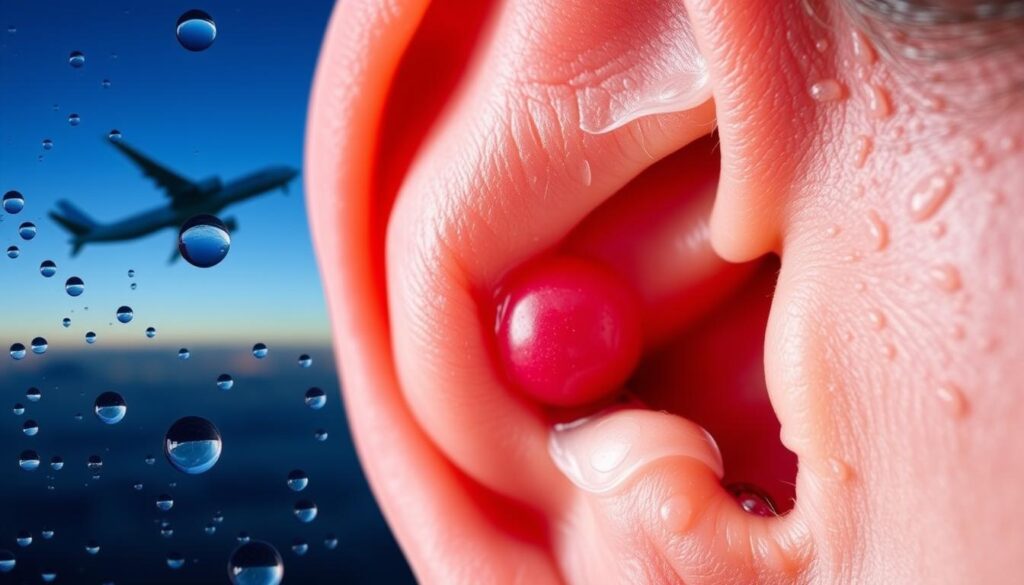How to Properly Care for Your Ears After an Ear Injury to Ensure Optimal HealingThis might be ear barotrauma, caused by sudden changes in air or water pressure. It can make one or both ears hurt, leading to discomfort, pain, hearing loss, and even vertigo. But what is it, and how can you avoid it on your next adventure?
Key Takeaways:
- Ear barotrauma, also known as “airplane ear,” is caused by pressure differences between the middle ear and the surrounding environment.
- Common symptoms include ear pain, feeling of fullness, muffled hearing, and in severe cases, severe pain, hearing loss, and vertigo.
- Risk factors include a small Eustachian tube, sinus infections, and sleeping during air travel or diving.
- Preventing ear barotrauma involves techniques like yawning, swallowing, and using the Valsalva maneuver to equalize pressure.
- Filtered earplugs can also help slowly equalize pressure during ascents and descents.
What is Ear Barotrauma?
Definition and Overview
Ear barotrauma, also known as “airplane ear,” happens when there’s a pressure difference in the middle ear. This imbalance can occur during air travel, scuba diving, or when exposed to explosions. It can cause stress on the eardrum and lead to injury.
The eustachian tube helps regulate air pressure in the middle ear. If it can’t adjust quickly to pressure changes, ear barotrauma symptoms appear.
Ear barotrauma, also called airplane ear, is a big health concern for flyers. Babies and young kids often feel more pain because their ears are still developing. It can also happen in elevators, mountain drives, or during water activities like scuba diving.
Scuba divers call ear barotrauma “ear squeeze,” which gets worse as they dive deeper.
“To prevent further complications like tinnitus, which causes persistent ear ringing, there are solutions that promise to reduce symptoms and improve hearing health. One such solution can be found here.”
Common Causes of Ear Injury from Barotrauma
Ear barotrauma can happen from many activities with quick air pressure changes. Main causes include air travel, scuba diving, and being near explosions. Also, using hyperbaric oxygen chambers for medical reasons can cause it. Even simple things like riding an elevator in a tall building or driving in the mountains can lead to minor barotrauma.
Air travel is a big problem, especially during takeoff and landing. The fast pressure changes can make the middle ear inflamed or filled with fluid. This can cause pain, hearing loss, and even ruptured eardrums.
Scuba diving is also risky because pressure increases with depth underwater. In the US, about five million certified SCUBA divers face risks, with 500 to 1000 nonfatal injuries each year. These injuries often come from barotrauma, causing fluid or blood in the middle ear, pain, hearing loss, and eardrum perforation.
Explosions, like those in war zones, can also cause ear barotrauma. The blast’s sudden pressure can rupture the eardrum and harm the middle and inner ear. This can lead to hearing loss, ringing in the ears, and balance problems.
Hyperbaric oxygen chambers for medical treatment can also lead to ear barotrauma. The quick pressure changes during treatment can cause similar problems as air travel and scuba diving.

It’s important to recognize these common causes of ear barotrauma to take preventive steps. For individuals suffering from ear issues like ringing or whooshing sounds, there are effective remedies available that offer relief from tinnitus. Learn more about one such option here.
Risk Factors for Developing Ear Injury
Several factors can increase your risk of ear barotrauma and ear injury. A small or narrowed eustachian tube is a big risk. This is common in babies and toddlers.
Medical conditions also raise your risk. This includes the common cold, sinus infections, hay fever, and middle ear infections.
Conditions That Increase Your Risk
Sleeping during air travel is another risk. Not doing ear pressure techniques makes you more likely to get an ear injury.
Knowing these risks helps prevent ear barotrauma. This is especially true for activities like air travel, swimming, or loud noises.
| Risk Factor | Explanation |
|---|---|
| Small or Narrow Eustachian Tube | More common in infants and toddlers, can increase the risk of ear barotrauma. |
| Medical Conditions | Conditions like the common cold, sinus infections, hay fever, and middle ear infections can heighten the risk. |
| Sleeping During Air Travel | Without actively equalizing ear pressure, individuals are more susceptible to ear injury. |
Preventing Ear Injury During High-Risk Activities
To avoid ear injury from barotrauma in high-risk activities, there are several steps you can take. Yawning and swallowing during ascent and descent can help. This action opens the eustachian tubes, balancing the pressure. The Valsalva maneuver, where you gently blow while pinching your nostrils, is also helpful.
For those with congestion, using over-the-counter nasal sprays or decongestants before flying can help. Also, taking allergy medication if you have allergies can prevent ear barotrauma.
Wearing filtered earplugs is another good option. These earplugs help equalize pressure against the eardrum. They can greatly lower the risk of ear injury during high-pressure activities.
If these steps don’t work, you might need medical help. This could include tubes in the eardrums for those with severe or frequent ear barotrauma.
Ensuring proper ear care and protection will reduce your chances of suffering from long-term conditions like tinnitus. For those already experiencing these symptoms, there’s a solution that can help improve hearing and reduce ear ringing. Check it out here.
Conclusion
Ear barotrauma is a common issue caused by pressure changes. It can lead to serious ear injuries if not treated. Knowing the causes and how to prevent it helps protect your hearing during activities with air pressure changes.
Following self-care tips and getting medical help when needed can reduce ear injury risks. This ensures a safer and more enjoyable experience in high-risk activities.
Using ear protection, fitting helmets right, and teaching athletes about gear are key to protecting your ears. Knowing the signs of ear injuries and getting medical help quickly is also important. This helps avoid long-term problems like hearing loss and balance issues.
By focusing on ear health and preventing ear barotrauma, you can enjoy activities more confidently. This keeps your hearing and overall well-being safe.
For those suffering from tinnitus—persistent ringing, buzzing, or clicking sounds in the ears—a product is available that promises to alleviate these symptoms and promote better hearing function. Learn more about this option here. By taking preventive steps and exploring helpful remedies, you can preserve your ear health and enjoy activities without fear of long-term ear damage.
FAQ
What is ear barotrauma?
Ear barotrauma is a medical issue caused by sudden pressure changes. This can stress the eardrum and lead to injury. It’s often called “airplane ear” because it happens when air pressure in the ear doesn’t match the outside environment, especially during flights.
What are the common causes of ear barotrauma?
Common causes include air travel, especially when the plane goes up or down. Scuba diving also causes it as pressure increases underwater. Other causes are explosions and hyperbaric oxygen chambers for medical treatment.
What are the risk factors for developing ear barotrauma?
Risk factors include a small or narrow eustachian tube, common in young kids. Medical conditions like colds, sinus infections, and allergies also increase risk. Sleeping during flights makes it worse because you can’t adjust the ear pressure.
How can you prevent ear injury from barotrauma during high-risk activities?
To avoid ear injury, try these steps: yawn and swallow during changes in altitude. Do the Valsalva maneuver. Use nasal sprays or decongestants before flying, but with caution. Take allergy meds if needed. Wear earplugs that help equalize pressure.
For those dealing with chronic ear ringing or discomfort, check out this solution to help ease symptoms and improve hearing health.
Source Links
- Airplane ear-Airplane ear – Symptoms & causes – Mayo Clinic – https://www.mayoclinic.org/diseases-conditions/airplane-ear/symptoms-causes/syc-20351701
- Ear barotrauma – https://www.mountsinai.org/health-library/diseases-conditions/ear-barotrauma
- What Is Ear Barotrauma? – https://www.webmd.com/a-to-z-guides/ear-barotrauma-facts
- Barotrauma – StatPearls – NCBI Bookshelf – https://www.ncbi.nlm.nih.gov/books/NBK482348/
- Ear Injuries (for Parents) – https://kidshealth.org/en/parents/ear-injuries.html
- Otitis Externa – StatPearls – NCBI Bookshelf – https://www.ncbi.nlm.nih.gov/books/NBK556055/
- Hearing loss – Symptoms and causes – https://www.mayoclinic.org/diseases-conditions/hearing-loss/symptoms-causes/syc-20373072
- Cauliflower Ear – StatPearls – NCBI Bookshelf – https://www.ncbi.nlm.nih.gov/books/NBK470424/
- Middle ear injury through the external auditory canal: a review of 44 cases – PubMed – https://pubmed.ncbi.nlm.nih.gov/17168148/
- Addressing Ear Injuries on the Field – Ear Surgeon – https://earsurgeon.in/addressing-ear-injuries-on-the-field/
- 0001340274.INDD – https://academic.oup.com/milmed/article-pdf/176/11/1306/20893206/milmed-d-10-00318.pdf



